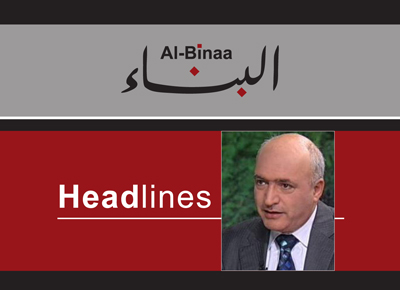French and German Foreign Ministers in Damascus to Include Kurds and Sects in State-Building / Clashes Between the Army and Armed Groups on the Border as Al-Sharaa Invites Mikati for Bilateral Talks
Scandal of the Iranian Plane Search Ends "Without Yield" as Al-Khatib Urges Mawlawi to Act With Courage in the South

January 04, 2025
The political editor wrote
The French and German Foreign Ministers concluded a swift visit to Damascus, focusing on Europe’s readiness to engage with Syria’s new government and negotiate the gradual lifting of sanctions. The process hinges on monitoring the establishment of a new state aligned with inclusive standards during the transitional phase, expected to culminate in a civil constitution and credible elections. The ministers emphasised that the cornerstone of a credible political process is successfully integrating the Kurds into the transition, including their involvement in building a new army, drafting the constitution, and forming the government. In exchange, Europe expressed readiness to facilitate negotiations with Kurdish representatives, provided sufficient guarantees are in place to ensure their future political role and regional security.
Meanwhile, Lebanese-Syrian relations resurfaced as a key topic following clashes along the shared border in the Bekaa and Akkar regions. Armed groups opened fire on the Lebanese Army as it attempted to close illegal smuggling routes, injuring several soldiers. The skirmishes lasted hours until reinforcements from Damascus intervened to contain the armed groups targeting Lebanese forces.
In the evening, Ahmad Al-Sharaa, head of Syria’s interim administration, extended an invitation to Lebanese Prime Minister Najib Mikati to visit Damascus for discussions on bilateral relations. The new Syrian administration also announced a ban on entry for Lebanese citizens lacking permanent residency in Syria. This was reportedly in response to Lebanon’s restrictions on Syrian entry, which Lebanese officials argue are necessary given the strain of nearly two million Syrian refugees in the country.
In Lebanon, the fallout continued over the incident involving an Iranian plane carrying Lebanese pilgrims returning from holy sites in Iran. The plane was subjected to an exceptional inspection lasting several hours, with foreign personnel reportedly involved, according to passengers. The passengers, primarily linked to Hezbollah’s support base, were allegedly singled out for punitive treatment tied to sectarian and political motives. The inspection, described as retaliatory by some and punitive by others, was seen as targeting the resistance’s community under foreign influence. The event gained traction following Al-Hadath channel’s false claims that billions of dollars were being transported on the plane. After the scandal concluded “without yield”, Sheikh Ali Al-Khatib, Vice President of the Supreme Islamic Shiite Council, expressed outrage at the treatment of the Shiite community as though it were a defeated faction. He called on Interior Minister Bassam Mawlawi to show courage in addressing Israeli violations in the south, where the occupier disregards sovereignty and international agreements.




